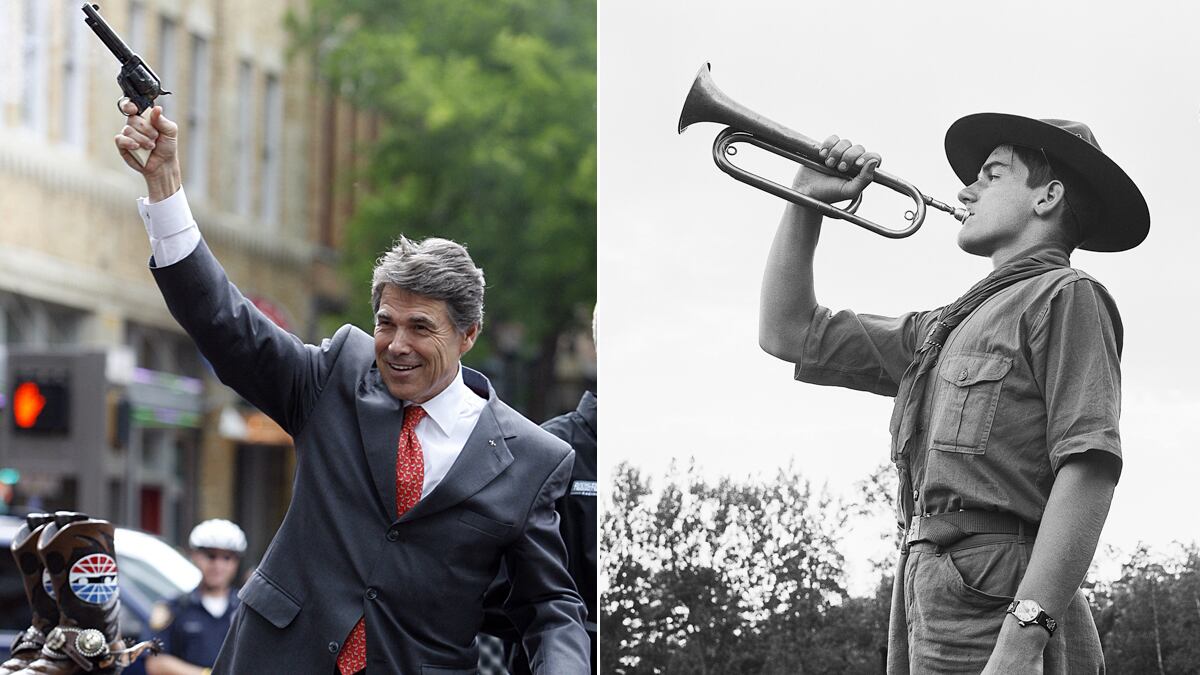The fight is still fresh for Mitt Romney and Rick Perry. But the 2012 campaign isn’t the first time the governors have found themselves in a disagreement. Their first spat was over a cause near and dear to the Texas governor’s heart—when Romney rejected the services of the Boy Scouts for the 2002 Salt Lake City Winter Olympic Games. You don’t get in the way of America’s Tiger Cubs or Cub Scouts—not if Rick Perry has anything to do say about it.
In Perry’s account, Romney, a fellow Eagle Scout, nixed a plan to allow Olympic workers to stay at a Scout camp because the Olympic bureaucrats were scared of protest. In 2000 the Supreme Court had ruled that the Boy Scouts could legally exclude open homosexuals from their ranks. Adding insult to injury, neither Perry nor any other Scout booster heard a peep from Romney about the dis, Perry says in his 2008 book, On My Honor: Why the American Values of the Boy Scouts Are Worth Fighting For, an ode to America’s Scouting youth.
Even worse? Romney had the same squishiness into his first campaign, a 1994 run against Sen. Edward Kennedy. Perry writes in the book: “Whether pressure from gay rights groups caused Olympic organizers to resist volunteer assistance from Scouts, we know that Romney, as a political candidate in the politically liberals [sic] state of Massachusetts, has parted ways with the Scouts on its policies over the involvement of gay individuals in Scout activities.”
At the time of the Olympics, Romney said there was no beef: “We’re very pleased to have Scouts help out,” he told the Deseret News. The local troops were being excluded not because of politics, but because of an age requirement, Olympic officials said. Later Romney was criticized by Democratic opponents for sitting on the Boy Scouts of America board, even though he had disavowed the organization’s stance on homosexuality. Perry, who likens homosexuality to alcoholism—genetic but ultimately degrading only if the afflicted individual gives in to temptation—stands firmly behind the organization’s decision to exclude open gays. “I do not believe the teaching of sexual preference fits within the parameters of Scouting’s mission,” he writes.

Today, there are 2.7 million Boy Scouts and more than 1 million adult volunteers involved in 115,000 units. Many of those families likely appreciate Perry’s rectitude and his steadfast defense of their uniformed youth. Those millions make for a good start to a grassroots campaign, even if most of the Scouts aren’t old enough to enter the voting booth.
Perry isn’t the first candidate to go from Scouting to stumping. We’ve even had an Eagle Scout in the White House before. Young Jerry Ford earned the honor in 1927. John F. Kennedy was a member of Bronxville, N.Y.’s Troop 2 when his family lived there. We’ve had Eagle Scouts scarf down corn dogs in Iowa mud patches, too. See Democrat Dick Gephardt, who earned his medal in 1955. But it’s safe to say we’ve never had a presidential wannabe with such affection for the outdoors program. Rick Perry is the first, and I’ll bet my bugling badge the last, presidential candidate ever to write a whole book in praise of Scouting.
They say Rick Perry has great instincts. He’s never lost an election, after all. From the book’s beginning, Perry’s horse sense is on full display. “You may be wondering,” Perry writes, “‘why would the governor of the second largest state choose to write his very first book about the Boy Scouts?” Yes, why? Because if you want to understand Rick Perry, the man, you'd better get to know Rick Perry, the Boy Scout.
Perry is from the fly-speck town of Paint Creek, Texas. His father called the place Big Empty, and Scouting filled the void. The man to see in Paint Creek was scoutmaster Gene Overton, a “cigar-chewing, pickup-driving, cow-counting, tractor-driving farmer,” his son Mike Overton, a veterinary doctor, tells The Daily Beast. On the Overtons’ 500-acre farm, Rick and the boys would run ragged. When anyone got out of line, Mr. Overton would step in.
“Mr. Overton could have descended from Mount Sinai. What he said was law,” Perry writes.
Riley Couch, a Dallas banker who came up with Perry, recalls how Overton administered justice.
“He had a board of education,” Couch says. “It was a paddle.”
Overton not only helped Perry and his friends earned their badges; he also opened up a world outside Paint Creek. They drove to Dallas for state fairs. Couch and a couple of buddies sneaked into a hotel, where they rode an elevator for the first time. They went to College Station for football games, where Perry fell hard for Texas A&M, Overton’s alma mater. In 1964 Perry joined the Scouts’ National Jamboree in Valley Forge, Pa. President Lyndon Baines Johnson went, too.
“Kennedy was killed in November 1963. Needless to say, the Texas Scouts weren’t too popular,” says Couch. “I remember the first night there—Rick wasn’t in my tent—New Mexico Scouts started throwing things at us. Next thing, a hatchet flew past me. Rick got along with the foreigners, as we called them.”
Perry’s view of the outside world hasn’t changed too much since then. He’ll vigorously defend the Scouts no matter who the perceived enemy might be. Besides that turncoat Romney, there are bullies everywhere. Atheists and gay activists are the most threatening.
His biggest bugaboo might be the American Civil Liberties Union, the individual-rights organization, which has been particularly litigious when it comes to the Scouts. Everywhere, Perry sees an assault on his wholesome Scouts; the judiciary and the ivory tower are both stacked with liberal relativists. Psychiatrists are overdrugging America’s kids. Even the whole math movement has apparently run roughshod over, you know, normal arithmetic. Pretty typical of what keeps conservatives up at night.
Is there anything for a liberal to love in this Eagle Scout? Well, sure. According to On My Honor, Perry and Michael Dukakis once had a conversation. Perry grew up on a farm with free-range eggs. Perry has a conservationist’s soul (just don’t ask him about that climate-change stuff). Perry watches women’s tennis. Perry once listened to the Dave Matthews Band and can quote Sting (“Even a casual listener of the Dave Matthews Band or The Police must nod his/her head in assent at the notion that we are all like ‘ants marching’ or ‘packed lemmings into shiny metal boxes, contestants in a suicidal race.’”)
So how do Perry’s old Scouting buddies feel about his new national prominence?
Says Mike Overton, the son of the man who paddled Perry into the world, “You’ve come a long way, baby, from where we’ve started.”





